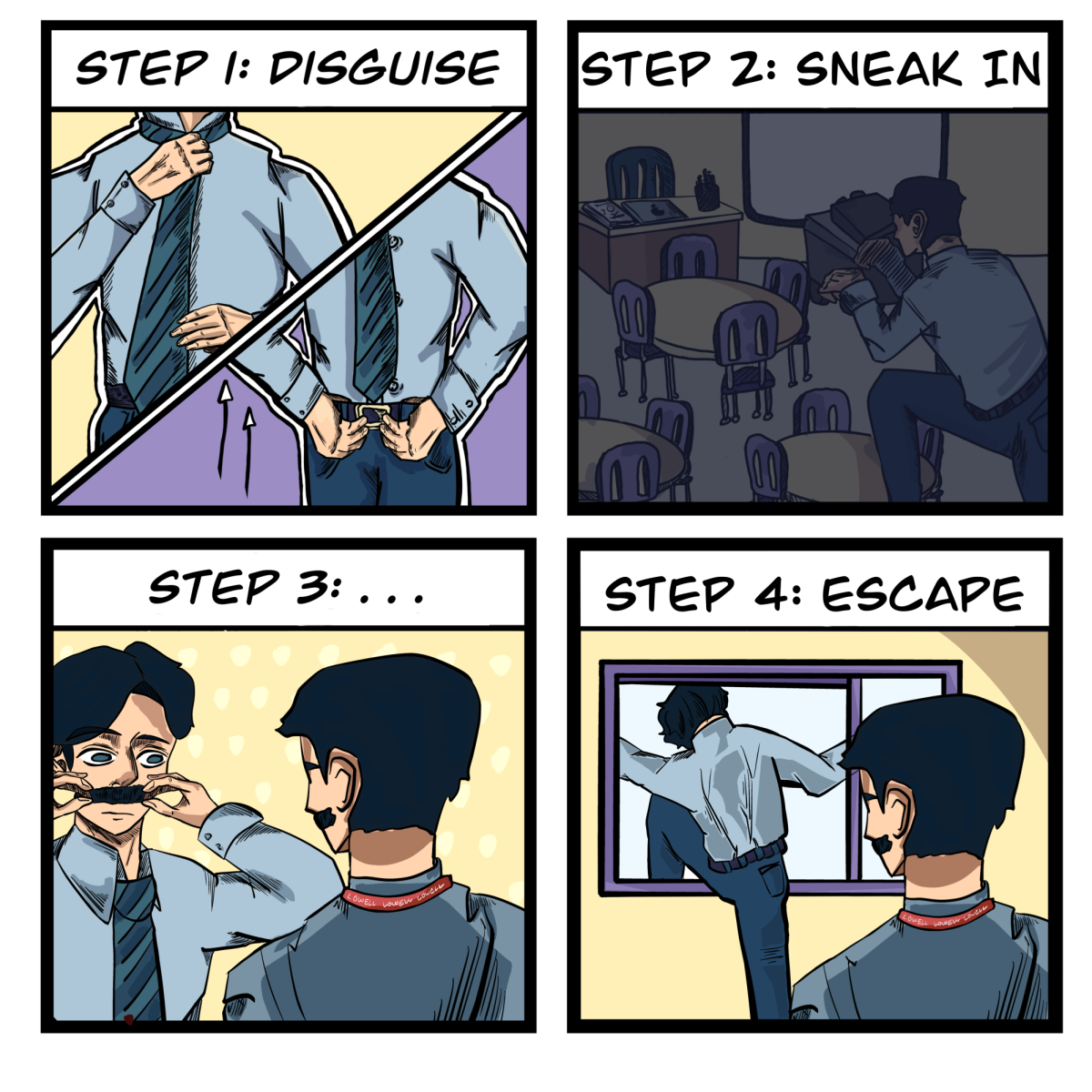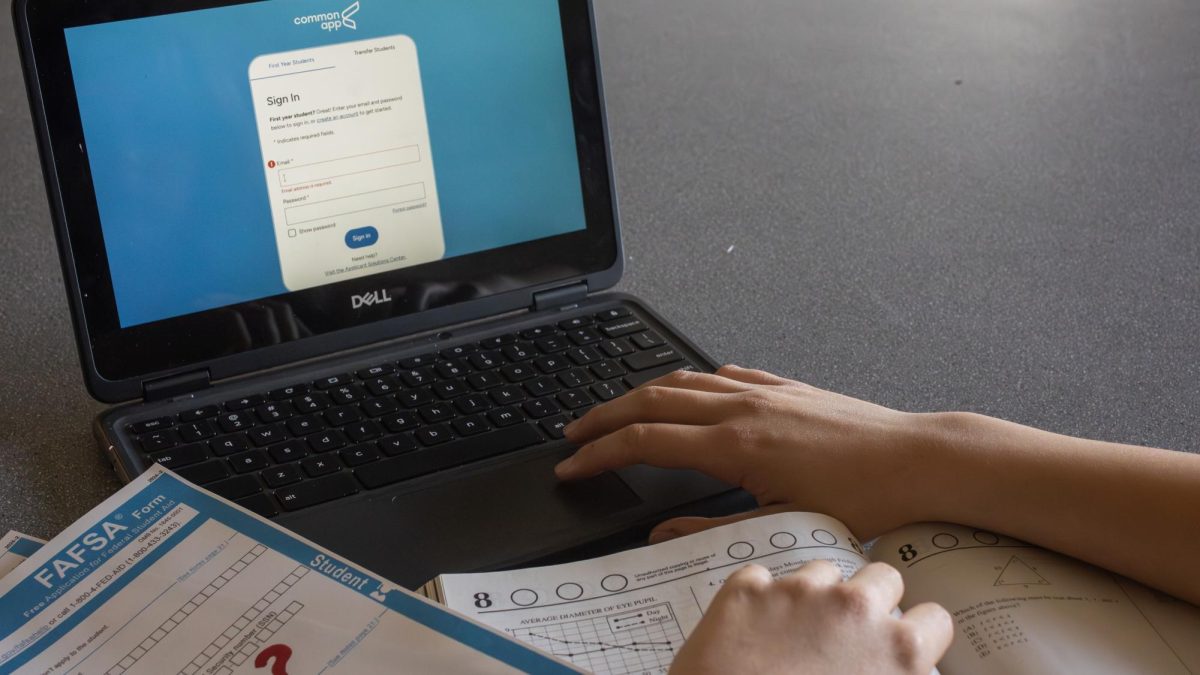As the final minutes of her class tick down, Carmen, a student under a pseudonym, is plagued with the dread she experiences almost every day before attending class. As she walks through the halls, she contemplates turning back and skipping her next class, but knows it will only lower her grade further. Her anxiety builds as she enters the locker room and begins to dress. Her heartbeat quickens with apprehension at the thought of the teacher pulling her aside for one of his invasive conversations. She said her teacher frequently singles out Carmen and her friends with uncomfortable comments on their clothes and personal lives. As she enters the gym, Carmen silently begins the mental countdown until class is over, allowing her to escape the stressful classroom environment created by her teacher’s behavior.
Carmen is not the only student who has experienced verbal harassment from a teacher at Lowell.

Verbal harassment from teachers, or inappropriate and invasive comments made by teachers to students, is a prevalent, yet often overlooked, issue at Lowell. In a September 2024 survey conducted by The Lowell of 104 students, 36 percent of respondents reported that a teacher at Lowell had caused them to feel uncomfortable, and 20 percent reported that a teacher had spoken or acted inappropriately in front of the class. Additionally, 53 percent reported that they knew of other students who had complained about inappropriate conduct from a teacher at Lowell. Students said the harassment they experience is frequently gender-based, with male teachers often targeting female students with inappropriate jokes and comments about their appearances and personal lives. Students who have experienced harassment from teachers feel that their experiences have been discounted because they lack the severity of physical harassment. However, verbal harassment has had detrimental effects on their mental health and experience at school. Although Lowell’s administration has made efforts to address student reports of harassment and work with teachers to reform inappropriate behavior, this issue has persisted.
According to Dr. Elizabeth Jeglic, a psychology professor at John Jay College of Criminal Justice, verbal harassment from teachers consists of comments that cross professional boundaries and make students feel uncomfortable. Dr. Jeglic believes that the invasive comments received by students at Lowell qualify as a form of sexual harassment. “[The comments] are sexual in nature and are a boundary violation,” Dr. Jeglic said. “They are also red-flag grooming behaviors, and can be indicative of nefarious intent.” Data from Dr. Jeglic’s 2022 study of educator sexual misconduct in high schools illustrates a pattern in the gender dynamic of this misconduct, with 85 percent coming from male teachers and 72 percent targeted at female students. Additionally, the study found that out of the respondents who had been harassed, 94 percent had experienced verbal harassment. The impacts of harassment can continue beyond high school, she said, negatively affecting some students years into the future. “We found that in young adulthood, those students who had experienced educator sexual misconduct experienced poorer quality of life, increased substance abuse, higher levels of suicidal behaviors, and increased risk for subsequent victimization,” she said. Although the inappropriate comments received by students vary in severity, Dr. Jeglic believes that all inappropriate behavior from teachers has a detrimental effect on students. “It can leave the student feeling violated when a professional, who is supposed to be looking out for their best interests, crosses that boundary,” she said.
Students who say they have experienced verbal harassment from teachers believe that in order to solve this issue, people need to share their experiences and work together to advocate for change. Hannah said that she felt isolated and invalidated in her experiences because others did not recognize the harm of her teacher’s comments. “I felt I was the only one, and I was so alone in that classroom. Even writing up the counselor’s report, I remember not wanting to turn it in,” she said. “I felt my feelings towards the whole situation were invalid, and that [the harassment] wasn’t really happening because everyone refused to see it.” According to Dr. Jeglic, only around 10 percent of the students who have experienced harassment file a formal report. “There is guilt and shame that goes along with the victimization, and that prevents disclosure,” she said. Carmen believes that if other students speak up about the verbal harassment that they have experienced from teachers, teachers will be pressured to reform their behavior or face heightened repercussions. “When teachers come back [from leave], nothing is changing,“ she said. “I want to actually see a difference in behavior from these teachers, because it’s affecting kids’ grades, it’s affecting kids’ attendance, and it’s affecting their mental health.”
Lowell students who have experienced verbal harassment feel that it significantly impacted their daily lives while attending school, causing them to feel stressed and wary of further inappropriate actions from the teachers involved. According to Carmen, her teacher repeatedly made invasive comments about the personal lives of Carmen and other female students in her class. The most uncomfortable experience she had in the class, she said, was when her teacher informed her that he knew where she lived. “He told me, ‘I can see your address on StudentVue, and I knew you lived in my neighborhood because I saw you at the bus stop with a boy,’” she said. Comments such as these created a hostile educational environment for Carmen, and discouraged her from attending the class. “It made me really anxious to go to class,” she said. “I had so many absences for that class that year because I just didn’t have it in me to deal with that teacher.”
Jessica, a junior under a pseudonym, said that she has experienced harassment from both male and female teachers. Jessica felt uncomfortable with her male P.E. teacher’s choice of words while reprimanding her for wearing running shorts instead of the standard P.E. uniform shorts. According to Jessica, her teacher told her, “You can’t be wearing those shorts. They’re distracting me and the rest of the class.” She said one of Jessica’s female teachers made similar commentary about her appearance, as well as her romantic life. “She would try to get [involved in] my personal life, and would constantly insinuate that I was dating someone in the class and say inappropriate comments,” she said. In one instance, Jessica said, she came to school with long fake nails, and her teacher pointed them out to the student who she insinuated was dating Jessica, making a suggestive statement about Jessica and her nails. While Jessica’s teachers did not make explicitly sexual or otherwise threatening comments towards her, she said their behavior made her feel uncomfortable.

According to Dr. Jeglic, verbal harassment from teachers crosses professional boundaries, causing students to lose trust in the adults who are meant to support them and help them learn. Hannah, a senior under a pseudonym, said she experienced discomfort in a class where a teacher made inappropriate and suggestive comments toward his students. According to Hannah, the primary targets of these comments were female students like herself. Her teacher commented on his students’ weight and eating habits, referring to his students as overweight if they ate food in class, she said. Like Jessica, her teacher’s invasive behavior ranged from comments on his students’ bodies to speculation on their romantic feelings. “[The teacher] made a comment saying that I was obsessed with him in a romantic way. The novel we were reading in class had unrequited love in it, and he referenced that being me to him,” she said. Although the comments weren’t explicitly inappropriate, Hannah said, they crossed the line in terms of teacher-student interactions and made the classroom environment feel uncomfortable.
Verbal harassment is more difficult to quantify than other forms of harassment, and easier to deny. According to Hannah, many of the inappropriate comments that she received from her teacher were framed as jokes. She feels that framing their harassment in this way has allowed her teacher, and others like him, to deny the harmful nature of their comments. “The teachers that are acting this way know that they can’t cross the line,” Carmen said. “They know that they can’t be overly inappropriate with the student, or put their hands on a student, but instead, they’ll make inappropriate comments.” Jessica has struggled to gain validation for her experiences of inappropriate behavior from her P.E. teacher. She shared her story with her counselor, but feels that her report was unfairly dismissed. According to Jessica, her counselor claimed that Jessica’s teacher had an older teaching style and was not aware that his comments were inappropriate. She feels that excusing the teacher’s behavior in this way was harmful and unjustified. “It gives teachers the benefit of the doubt when they’re saying inappropriate things to minors, and they should be reprimanded for that,” she said.
Lowell’s administration is limited by legal and district policies in their ability to address reports of harassment. The San Francisco Unified School District (SFUSD) provides Lowell’s administration with guidelines that they are required to uphold, and is in charge of taking disciplinary action against any teacher who is found to be guilty of significantly harmful and inappropriate actions concerning a student. According to Assistant Principal Isaac Alcantar, the distinction between more minor offenses and significantly inappropriate conduct is one that must be made on a case-by-case basis, after Lowell’s administration conducts an investigation into the report and gathers evidence. “If it was something to the effect of using inappropriate language or addressing students in a way that was unprofessional, that might be something where the administration just brings a teacher in and brings it to their attention,” Alcantar said. Under these circumstances, he said, a teacher would be notified that their conduct was inappropriate, and told to make adjustments to their behavior in the future. “If it’s something very inappropriate and harmful [in terms of] interactions with students, then we would let our district lead know, and they would be contacting our legal department,” he said. When a report is determined to be severe enough to be sent to the SFUSD legal department, he said, Lowell’s administration is no longer in charge of any decisions relating to the report. According to Principal Jan Bautista, Lowell’s administration is devoted to addressing all reports of harassment that they receive. “Every report is significant,” Bautista said. “We do the investigation and gathering of information so that we can consult with the district offices about what degree, what level, how do we respond?” However, she said that reports made against staff, and subsequent investigations into these reports, are personnel issues and cannot be discussed with students.
Although Lowell’s administration is required to maintain confidentiality about the outcomes of reports and investigations, this lack of transparency feels frustrating and discouraging to students like Hannah. Hannah visited the counseling office to report her teacher for what she considered his inappropriate behavior, but saw no change. “They gave me this form for sexual harassment, and it said to explain details, give us bullet points of what’s happened, and then we’ll see if it’s worth bringing up to the dean,” she said. “Clearly, it wasn’t. I never heard about it again, and the suggestive comments just kept on coming.” Carmen has struggled to achieve long-term results from her reports. “I reported him multiple times, maybe three or four times throughout the year, and the most that happened was that he went on leave for a little bit, but he’s still teaching,” she said. “He is having some consequences, but it’s not long term.” According to Dr. Jeglic, action against harassment in schools is often difficult to implement, with some believing that the issue is not severe enough to address. “We found that 11.7 percent of kids are experiencing harassment, so this is a very serious issue,” she said. “It is not negligible, and it has lasting consequences.” Jessica feels that teachers should receive harsher repercussions for verbal harassment, as she believes that it has a significant negative effect on the mental health of the students being harassed. “No person should ever have to receive those comments from anyone,” she said. “If you’re going to make someone feel uncomfortable, you should face consequences for that.”




















